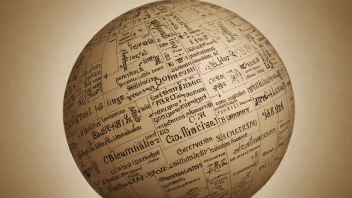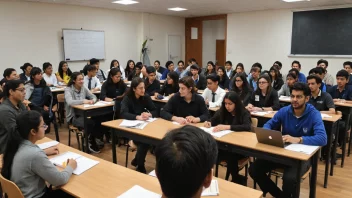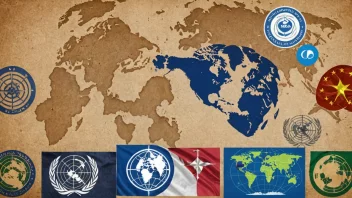In an increasingly interconnected world, the concept of global citizenship has gained significant traction, prompting discussions on how various disciplines contribute to its development. Among these, the humanities play a crucial role in shaping our understanding of cultural diversity, ethical responsibility, and social justice. By exploring the narratives, values, and histories that define human experiences, the humanities offer insights that are essential for fostering empathy and cooperation among individuals from different backgrounds. This article delves into the various ways in which the humanities contribute to the cultivation of global citizenship, highlighting key themes and examples that illustrate their importance.
Understanding Global Citizenship
Global citizenship transcends national boundaries, emphasizing a sense of belonging to a larger human community. It encourages individuals to engage with global issues such as poverty, inequality, and environmental degradation. At its core, global citizenship is about recognizing our shared humanity and the interconnectedness of our actions. The humanities provide the tools to navigate this complex landscape by encouraging critical thinking, ethical reasoning, and cultural awareness.
The Role of Literature in Fostering Empathy
Literature is one of the most powerful mediums through which the humanities communicate the complexities of the human experience. Through storytelling, readers are transported into the lives and struggles of characters from diverse backgrounds. This immersion fosters empathy, allowing individuals to understand perspectives different from their own. For instance, novels like Khaled Hosseini's "The Kite Runner" offer insights into the Afghan experience, while Chimamanda Ngozi Adichie's "Half of a Yellow Sun" sheds light on the Nigerian civil war. By engaging with these narratives, readers develop a deeper appreciation for cultural differences and the common threads that unite us.
History as a Tool for Understanding Contemporary Issues
The study of history is essential for understanding the present and shaping the future. By examining historical events, individuals can identify patterns, recognize the consequences of past actions, and learn from mistakes. This critical reflection is vital for global citizenship, as it enables individuals to engage with contemporary issues through an informed lens. For example, understanding the history of colonialism can illuminate current discussions around social justice and reparations. By recognizing how historical injustices continue to affect marginalized communities today, individuals are better equipped to advocate for change.
Philosophy and Ethical Frameworks
Philosophy plays a significant role in shaping our moral compass and understanding ethical responsibilities as global citizens. Through philosophical inquiry, individuals grapple with questions of justice, rights, and the common good. The works of philosophers like John Rawls, whose theory of justice emphasizes fairness, and Martha Nussbaum, who advocates for capabilities as a measure of human development, provide frameworks for evaluating our obligations to others. These ethical considerations are crucial for fostering a sense of responsibility towards global issues, encouraging individuals to take action in their communities and beyond.
Art and Cultural Expression
Art serves as a universal language that transcends cultural barriers, enabling individuals to express their identities and experiences. Through various forms of artistic expression, including visual arts, music, and performance, artists communicate messages that resonate on a global scale. For example, the works of artists like Ai Weiwei highlight human rights abuses, while musicians like Bob Marley advocate for social change. By engaging with art from different cultures, individuals can cultivate an appreciation for diversity and the shared struggles that define the human experience.
The Impact of Language and Communication
Language is a fundamental aspect of the humanities that shapes how we communicate and connect with one another. Understanding different languages and dialects fosters cross-cultural communication, breaking down barriers that can hinder collaboration. Language learning not only enhances cognitive abilities but also promotes cultural exchange and understanding. Programs that encourage multilingualism and intercultural dialogue contribute to the development of global citizens who are equipped to navigate an increasingly diverse world.
Education and Global Citizenship
Educational institutions play a pivotal role in integrating humanities into the curriculum, promoting global citizenship among students. By incorporating interdisciplinary approaches that combine literature, history, philosophy, and the arts, educators can foster critical thinking and empathy. Experiential learning opportunities, such as service-learning projects and global exchange programs, further enhance students' understanding of global issues and their role as active participants in creating positive change.
Challenges and Opportunities
Despite the clear benefits of incorporating humanities into the discourse on global citizenship, challenges remain. The prioritization of STEM fields in education and funding often sidelines the humanities, leading to a lack of resources and support for programs that promote cultural understanding. However, there is a growing recognition of the importance of a holistic education that values the contributions of all disciplines. Advocacy for the humanities as essential to developing informed, compassionate global citizens is crucial in addressing these challenges.
Conclusion
In conclusion, the humanities play an indispensable role in fostering global citizenship by promoting empathy, critical thinking, and cultural understanding. Through literature, history, philosophy, art, and language, individuals are equipped to engage with the complexities of the world around them. As we navigate the challenges of an interconnected global society, the insights and perspectives offered by the humanities will be vital in cultivating a sense of shared responsibility and commitment to social justice. By recognizing the importance of these disciplines, we can work towards a future where global citizenship is not only an ideal but a lived reality for all.






